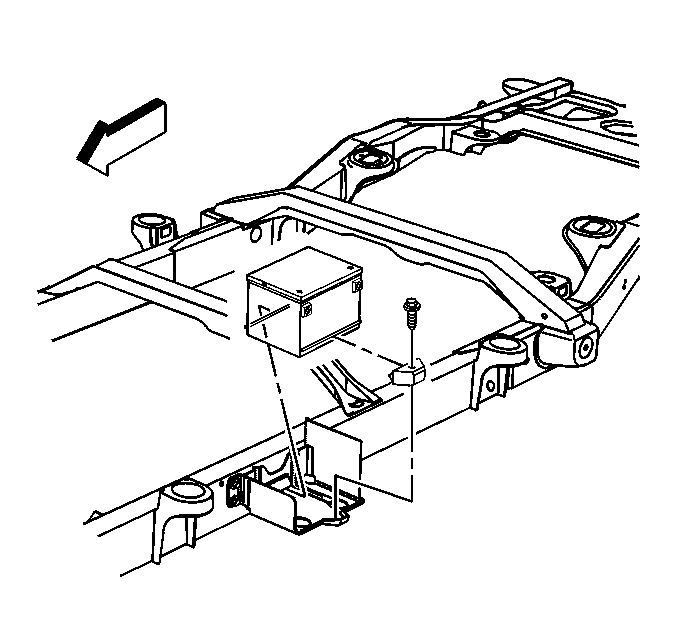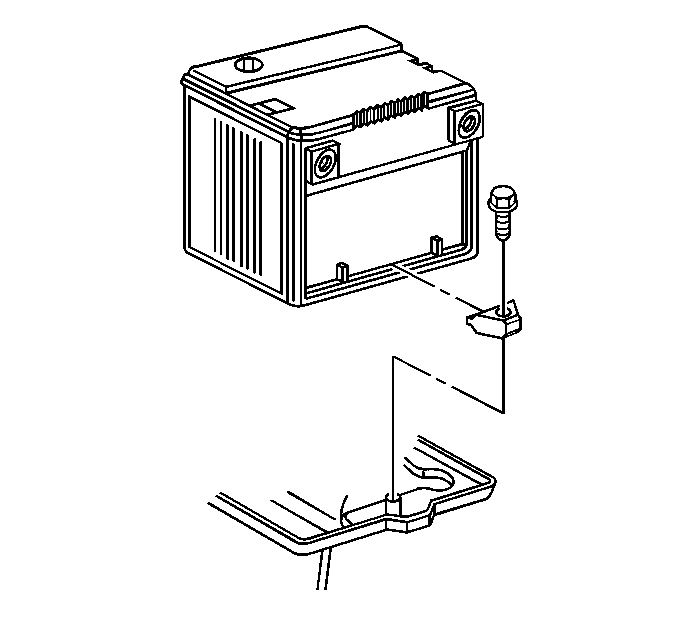Battery Replacement Rear
Removal Procedure
Caution: Batteries produce explosive gases, contain corrosive acid, and supply levels
of electrical current high enough to cause burns. Therefore, to reduce the risk of
personal injury when working near a battery:
• Always shield your eyes and avoid leaning over the battery whenever possible. • Do not expose the battery to open flames or sparks. • Do not allow the battery electrolyte to contact the eyes or the skin.
Flush immediately and thoroughly any contacted areas with water and get medical help. • Follow each step of the jump starting procedure in order. • Treat both the booster and the discharged batteries carefully when using
the jumper cables.
Caution: Batteries produce explosive gases. Batteries contain corrosive acid.
Batteries supply levels of electrical current high enough to cause burns.
Therefore, in order to reduce the risk of personal injury while working
near a battery, observe the following guidelines:
• Always shield your eyes. • Avoid leaning over the battery whenever possible. • Do not expose the battery to open flames or sparks. • Do not allow battery acid to contact the eyes or the skin. - Flush any contacted areas with water immediately and thoroughly. - Get medical help.
- Disconnect the battery negative cable from the negative battery terminal. Refer to Battery Cable Replacement in Engine Electrical.
- Disconnect the auxiliary positive and negative battery cables from the battery terminal. Refer to Battery Cable Replacement in Engine Electrical.
- Remove the rear battery tray from the vehicle.
- Remove the battery hold down retaining bolt.
- Remove the battery from the tray.

Installation Procedure
- Install the battery into the battery tray.
- Connect the hold-down retainer and bolt.
- Install the rear battery tray to the vehicle.
- Connect the positive and negative battery cables to the battery. Refer to Battery Cable Replacement in Engine Electrical.
- Connect the battery negative cable to the battery. Refer to Battery Cable Replacement in Engine Electrical.

Notice: Use the correct fastener in the correct location. Replacement fasteners must be the correct part number for that application. Fasteners requiring replacement or fasteners requiring the use of thread locking compound or sealant are identified in the service procedure. Do not use paints, lubricants, or corrosion inhibitors on fasteners or fastener joint surfaces unless specified. These coatings affect fastener torque and joint clamping force and may damage the fastener. Use the correct tightening sequence and specifications when installing fasteners in order to avoid damage to parts and systems.
Tighten
Tighten the hold-down retainer bolt to 25 N·m (18 lb ft).
Battery Replacement Front
Removal Procedure
Caution: Batteries produce explosive gases. Batteries contain corrosive acid.
Batteries supply levels of electrical current high enough to cause burns.
Therefore, in order to reduce the risk of personal injury while working
near a battery, observe the following guidelines:
• Always shield your eyes. • Avoid leaning over the battery whenever possible. • Do not expose the battery to open flames or sparks. • Do not allow battery acid to contact the eyes or the skin. - Flush any contacted areas with water immediately and thoroughly. - Get medical help.
- Disconnect the battery negative cable from the negative battery terminal. Refer to Battery Cable Replacement in Engine Electrical.
- Disconnect the battery positive cable from the positive battery terminal. Refer to Battery Cable Replacement in Engine Electrical.
- Remove the battery hold-down retainer bolt and retainer.
- Remove the battery from the vehicle.
- Inspect the battery for:
- If damage is noted, find and correct the cause.
- Clean any corrosion form the battery cables and connectors.
- Clean the battery tray and remove any foreign objects from the tray.

| • | Damage |
| • | Worn or corroded cables and connectors |
| • | Damage or foreign objects in the battery carrier |
Installation Procedure
- Install the battery into the battery carrier.
- Install the battery hold-down retainer and bolt.
- Connect the battery positive cable and the positive battery cable terminal to the battery. Refer to Battery Cable Replacement in Engine Electrical.
- Connect the battery negative cable and the negative battery cable terminal to the battery. Refer to Battery Cable Replacement in Engine Electrical.

Notice: Use the correct fastener in the correct location. Replacement fasteners must be the correct part number for that application. Fasteners requiring replacement or fasteners requiring the use of thread locking compound or sealant are identified in the service procedure. Do not use paints, lubricants, or corrosion inhibitors on fasteners or fastener joint surfaces unless specified. These coatings affect fastener torque and joint clamping force and may damage the fastener. Use the correct tightening sequence and specifications when installing fasteners in order to avoid damage to parts and systems.
Tighten
Tighten the bolt to 25 N·m (18 lb ft).
